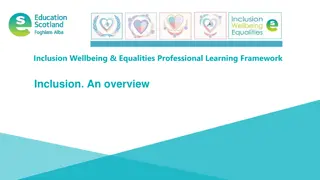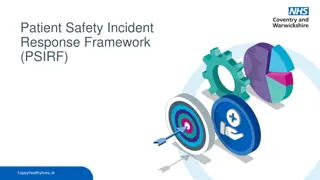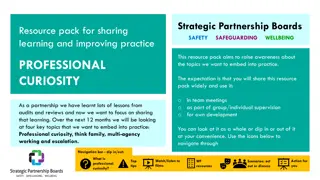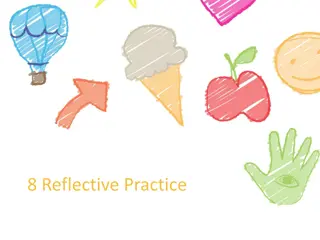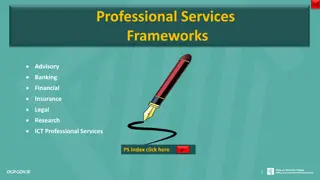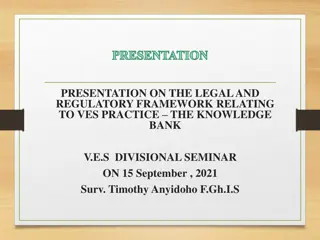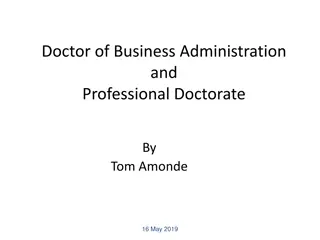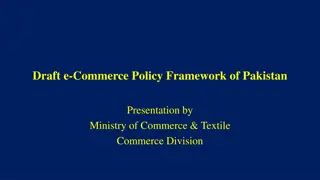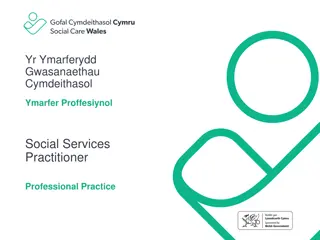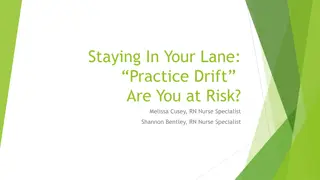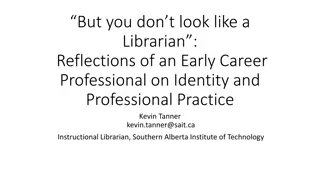PROFESSIONAL PRACTICE FRAMEWORK
The Professional Practice Framework supports nurses and midwives at Western Health in delivering the best care by setting standards, assessing capabilities, guiding development plans, and offering career pathways. It is aimed at professionals across the spectrum and focuses on leadership, research, evidence-based practice, education, and clinical expertise. The framework empowers healthcare professionals to provide excellent care informed by Western Health's values.
Download Presentation

Please find below an Image/Link to download the presentation.
The content on the website is provided AS IS for your information and personal use only. It may not be sold, licensed, or shared on other websites without obtaining consent from the author.If you encounter any issues during the download, it is possible that the publisher has removed the file from their server.
You are allowed to download the files provided on this website for personal or commercial use, subject to the condition that they are used lawfully. All files are the property of their respective owners.
The content on the website is provided AS IS for your information and personal use only. It may not be sold, licensed, or shared on other websites without obtaining consent from the author.
E N D
Presentation Transcript
PROFESSIONAL PRACTICE FRAMEWORK Supporting Western Health s nurses and midwives to deliver Best Care
Introduction Intent The Professional Practice Framework seeks to: make explicit the expected and aspirational standards for our nurses and midwives when working and learning provide a consistent and objective method for you to assess your capability, and review and measure your performance and achievements. provide support to formulate and guide future development plans and advance your career goals. The Framework is designed to be read alongside Western Health s Strategic Priorities to ensure it meets the needs of nurses, midwives and Western Health. It informs: Position Descriptions of all nurses and/midwives Performance and development planning (Appraisal cycle) Career and education pathways Workforce planning recruitment, interviewing and orientation activities
Who is it aimed at? The Framework is designed to support nurses and midwives across the professional spectrum including: undergraduate students, early career nurses and midwives, more experienced nurses and midwives, those in advanced practice roles, those in primary leadership roles Senior managers and leaders in the professions We believe that it will: provide consistent professional advice, aid in workforce planning, offer a tool to support career planning and development pathways be an invaluable resource for our staff and the wider Western Health team.
The Framework The Framework is structured around the five domains of practice: 1. Leadership 2. Research 3. Evidence based practice 4. Education 5. Clinical expertise Surrounded by the Best Care domains Informed by Western Health's Values. Collectively, this enables all nurses and midwives to deliver Best Care to our community. Ackerman et al (1996), ACN (2019).
Leadership Clinical leadership includes: a clinician with management or leadership roles who can use their positional power to change behaviour, practice or performance any nurse of midwife that can use their influence to change behaviour, practice or performance. You do not need to be in a formal management role to be a leader.
Research Research is an essential element of what underpins our professional practice. It drives clinical decision-making and advances in nursing and midwifery practices. Nurses and midwives: o generate knowledge through leading research o collaborate in research o participate in research o read and learn from research to inform practice. We aim to build research capacity and capability, and enhance the research culture to provide tangible benefits for consumers, the community, staff, students and academics.
Evidence Based Practice Evidence-based practice is an approach to care which takes into account: the combination of high-quality research and evidence, clinical expertise, and consumer values. The successful application can: improve consumer outcomes, optimise systems support effective advocacy ensure safe, high quality care We encourage our nurses and midwives to challenge practice assumptions, ask questions and be curious about ways to improve practice.
Education Life-long learning is integral to nursing and midwifery, which includes: Supporting undergraduate student learning Early-career programs and transition to practice Continuing professional development (CPD) Mandatory CPD to support working safely in the workplace Opportunities to discover, explore and try out new clinical areas and specialities Specialty skills and knowledge development Post-graduate and Advanced Practice programs
Clinical Expertise Nurses and midwives are accountable and responsible for the care they deliver and prescribe or delegate. Critical decision making underpins safe, evidence-based care. Nurse and midwives contribute to: o clinical decision making o formation of the clinical plan o committees and decision- making processes. o Internal and external policy, standard and practice development. Expertise is different to experience and is not reliant on a specific career path.
PRACTICAL APPLICATION The Framework includes activities or opportunities you can use to support your professional practice development. You can use these suggestions to build a handy toolkit to support your professional journey.
Summary of Behaviour Levels Levels do not equate to roles or hierarchy within the workforce. Instead, the levels reflect what level of behavioural skill is required to achieve the desired care goals or outcomes in a given situation. Levels should be treated as cumulative, meaning that behavioural indicators at subsequent levels in the scale should be read in conjunction with the behaviours specified at any lower level. Some levels may serve as an aspirational standard in some instances, rather than accurately reflecting current practice capability. In applying the framework, the levels are progressive and build on each level
Skill Acquisition Where a gap exists between current and future practice behavioural skill requirements, there should be aspiration to meet the standard specified. Aspiration should be included in the performance development process. Dreyfus 2004, Benner 2001
Career Pathways Skill acquisition may not always be linear There may be a period of novice activity in any new role before competence, proficiency and expertise is achieved.
Using the Framework The Framework will be utilised to guide conversations, shape future role development and assist in career planning. For example: Guiding the annual performance review conversation Supporting the process for progression to CNS/CMS Enabling nurses and midwives to map future career goals Informs position descriptions for new roles and sets expectations on experience and performance indicators The framework can practically support: the development of new roles and advanced practice pathways recruitment, interviewing and orientation activities workforce planning in articulating skill mix and experience recognition performance improvement conversations consistency across the health service in relation to professional practice expectations and measures
For more information go to: https://westerly.wh.org.au/nursing-midwifery/home/professional-practice-framework & consult your Director of Nursing & Midwifery or a member of the Nursing & Midwifery leadership team

 undefined
undefined








